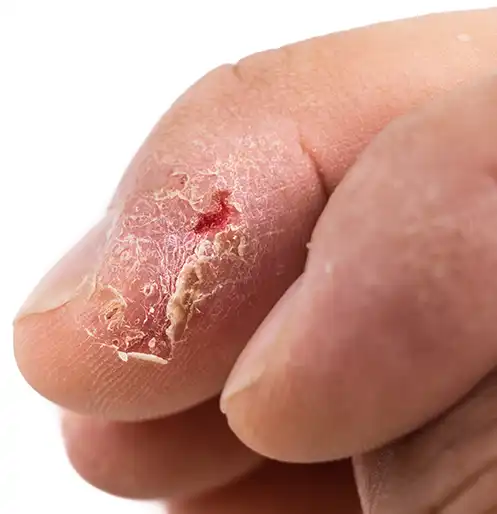What is a Fungal Infection?
The main function of the skin is to protect the inner body from microbes or pathogens, But being in direct contact with the outside world makes the skin susceptible to many different diseases. The majority of skin or fungal infections are caused by bacteria, fungi, or viruses.
Fungal infections, particularly on the skin and even nails (onychomycosis), are a common dermatological concern. Over-the-counter treatments for fungal infections can have varied results, and medications are frequently required to treat the condition. Fungal infections of the skin, particularly tinea (ringworm), can also require the use of tablets that are prescribed by a skin expert. Fungal infections can also damage the scalp, causing hair loss, and topical treatments are frequently required to treat the condition.
If one is suffering from any type of fungal skin infection, they can get it treated with a top skin expert and dermatologist in Delhi, Dr. Sarita Sanke at DermoRita Skin Clinic.
Types of Fungal Infections
- Athlete's foot
It is a fungal infection of the skin between the toes that, if left untreated, can spread to the rest of the foot. It looks like a delicate, white, cracked patch of skin, with red areas showing beneath. An athlete's foot can cause itchiness, burning, or stinging, as well as an unpleasant scent. The infection may spread to the nails, causing them to change colour and thicken. It spreads through wet floors and sharing your personal shoes or towels. For more details on fungal skin infections in Delhi, get in touch with skin experts at DermoRita Skin Clinic. - Fungal Nail Infections
Fungal nail infections (also known as tinea unguium or onychomycosis) are frequently caused by the spread of athlete's foot, but they can also arise on their own. The nail appears thick and discoloured (either white or yellowish). The nail may be brittle or crumbly, and parts of it, or the entire nail, may fall off. For optimal fungal nail infection treatment in Delhi, reach out to the skilled dermatologists at DermoRita Skin Clinic. - Jock Itch
The groyne and inner thigh become red and itchy as a result of jock itch (also known as tinea cruris). It is more common in men than in women, and it frequently develops in conjunction with an athlete's foot because the infection can travel from the foot to the groyne. - Ringworm
Tinea corporis is another name for ringworm. It is not caused by worms. It is a type of fungal infection caused by a fungus, which is very small in size. It forms a wing-like structure on the skin called ringworm. Ringworm patches are round, red, and itchy. They have a raised edge and a clear skin area in the middle. - Vagin-al Thrush
Itching, discomfort, or a burning feeling in the genital area are all symptoms of vaginal thrush. There may be a thick, white, or creamy vagi-nal discharge with no smell. - Oral Thrush
Oral thrush makes the mouth painful and inflamed. White patches may be visible on the tongue and inside the cheeks. If the white areas are scraped away, the skin beneath will be red and sore.
For comprehensive treatment of oral thrush and vagin-al infections in Delhi, consult Dr. Sarita Sanke, a specialist in fungal infection treatment, at DermoRita Skin Clinic.
Signs and Symptoms of Fungal Infection
The symptoms of a fungal skin infection differ depending on the type of fungus that causes it. Changes in the skin, hair, or nails may occur, which may or may not be uncomfortable. The fungus might damage one or more parts of the body. Fungal skin infections may result in a wide range of skin rashes.
The skin may:
- Be scaly, red, and irritating.
- Create a fine scale comparable to dry skin.
- Turn red and painful, and develop pus-filled areas.
Consult, Dr. Sarita Sanke, the Best Fungal Infection Treatment Doctor in Greater Kailash, Delhi at DermoRita Skin Clinic, if one is suffering from any type of skin or scalp fungal issue and wants healthy infection-free skin.
Fungal Infections Treatment in Delhi
Antifungal medications are classified into numerous categories. They are available as creams, sprays, powders, solutions, vagin-al tablets (pess-aries), shampoos, oral medications, and injections. Most work by destroying the fungus's cell wall, causing the fungal cell to die.
- Topical antifungals: These are prescribed by dermatologists for the treatment of fungal infections of the skin, scalp, and nails. They are available under a variety of brand names.
An antifungal cream is sometimes coupled with other drugs. When two actions are required. An antifungal cream is frequently mixed with a mild steroid cream, such as hydrocortisone to treat specific rashes. The antifungal cream clears the infection, while the mild steroid cream reduces the inflammation. - Antifungal shampoo: Sometimes, Keto-co-nazole shampoo is used to treat scalp fungal infections and certain skin problems.
- Antifungal pessaries: Some tablets are intended to be inserted into the vagina. Even some antifungal medications are used as pessaries to treat vaginal thrush.
- Antifungal injections: These injections may be used if an individual has a serious fungal infection in the body.
For more details, get in touch with experts at DermoRita Skin Clinic to get Best Treatment for Fungal Infections in Greater Kailash, Delhi.
Ways to Prevent Fungal Infections
- One can lower the chances of having a fungal skin infection by taking a few easy precautions
- After washing, pat the skin dry thoroughly, giving specific attention to skin creases
- Wash socks, shirts, and bed linen regularly to remove any fungi
- Do not wander barefoot in public spaces such as showers, saunas, and swimming pools
- Wear loose-fitting clothing made of cotton or a breathable material designed to keep sweat away from the skin
- Don't share towels, hairbrushes, or combs
- Change the shoes every two or three days to allow them to dry
- Control blood sugar if an individual has diabetes
- If someone in the family has scalp ringworm, wash bedding, hats, combs, and hair accessories in diluted bleach.

FAQs About Fungal Infection Treatment in Greater Kailash
1. Is a fungal infection contagious?
Yes. Infections caused by fungi can spread from person to person. They can also transfer from animals to humans and, in rare cases, from soil to humans. Fungi can be spread when individuals use contaminated clothing, bedding, or hairbrushes. To help prevent fungal infections from spreading, it is critical to get treatment and maintain good hygiene.
2. What happens if you don't treat fungal skin infections?
Fungal skin infections can remain for a long time if not treated. They may also spread to other parts of the body, develop a bacterial disease, or be transmitted to others. If an individual has a fungal infection on the scalp and does not treat it, they may develop a bald patch.
3. What is the usual duration of antifungal drug treatment?
A cream is normally administered for at least two weeks to treat fungal skin infections such as athlete's foot or ringworm. A cream may be required for up to six weeks in some cases.
Fungal infection can affect anyone. To find an effective treatment, consult the Best Fungal Infection Specialist in Delhi at DermoRita Skin Clinic.

